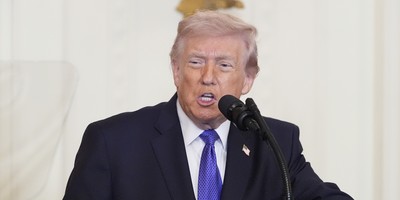The White House admitted recently that it offered Colorado Senate candidate Andrew Romanoff a job at the U.S. Agency for International Development, but it has never said specifically what it offered Rep. Joe Sestak to keep him from challenging Arlen Specter in the Pennsylvania Senate primary.
"Efforts were made in June and July of 2009 to determine whether Congressman Sestak would be interested in service on a presidential or other senior executive branch advisory board," counsel Robert Bauer wrote in the one-and-a-half-page White House "report" on the matter. Neither Bauer nor White House spokesman Robert Gibbs provided any more details.

Serving on an advisory board, Bauer said, would allow Sestak to keep his seat in the House -- having a Democrat in that seat was a key part of the White House plan -- and still serve "in a high-level advisory capacity."
So former President Clinton made his famous call to Sestak, reportedly to discuss a spot for Sestak on the President's Intelligence Advisory Board. "I heard 'presidential board,' and I think it was intel," Sestak later said of his conversation with Clinton. Sestak said he rejected the idea out of hand.
Shortly after the release of the White House report, however, we learned that the rules of the intelligence board expressly forbid employees of the federal government from serving. As a member of Congress, Sestak is ineligible to be on the board.
So maybe Bauer meant another board. But a closer look at the other presidential boards the White House might have mentioned shows that they, too, bar federal employees.
There are three presidential boards in the White House. One is the intelligence board. Another is the President's Economic Recovery Advisory Board, which is made up, according to its bylaws, of members "who shall be appointed by the President, from among individuals not employed by the federal government." The third is the recently created President's Management Advisory Board, whose members, the bylaws say, "shall be appointed by the President from among distinguished citizens from outside the federal government."
Recommended
Even a lesser group, like the recently recast President's Council of Advisors on Science and Technology, is made up of "distinguished individuals and representatives from sectors outside of the federal government."
Rep. Sestak would be ineligible for all of them.
There's a good reason for the rules. Having a member of Congress serve on a presidential advisory board would violate the separation of powers.
"An advisory board is the president's way to get confidential advice, and if you have a member of Congress on the board, are they functioning as a member of the president's board or as a member of Congress?" asks a former White House lawyer. In any conflict with Congress, a president could never claim privilege over the advice he received if a member of Congress were part of the board giving him the advice.
"From a separation-of-powers view," says another former White House attorney, "a president wants command and control over his executive officers, and he wants input to come either from a member of the executive branch or a person reporting only to the executive branch."
That's why presidential boards bar members of Congress. But what about the other senior-executive-branch boards Bauer mentioned? Many of them don't include lawmakers, either. Take the Defense Policy Advisory Board, which advises the Secretary of Defense. There are no members of Congress on it, for the same reasons they don't serve on presidential boards. Would the board member be working for the Pentagon or for Congress? Besides, the Defense Department, like the president, gets plenty of advice, solicited and unsolicited, from Congress.
Finally, the Constitution forbids anyone from holding offices in both the legislative and executive branches at the same time. Article I, Section 6, known as the Incompatibility Clause, says "no person holding any office under the United States shall be a member of either House during his continuance in office." An unpaid board position for Sestak would probably not violate the clause -- that is perhaps why Bauer emphasized that the positions were unpaid -- but the principle of separation of powers is clear.
The bottom line is Sestak, as a member of Congress, could not have served on most, if not all, of the boards the White House claims it considered for him. Did the politically savvy Obama team really not know that? Or is the White House not telling us something?

























Join the conversation as a VIP Member